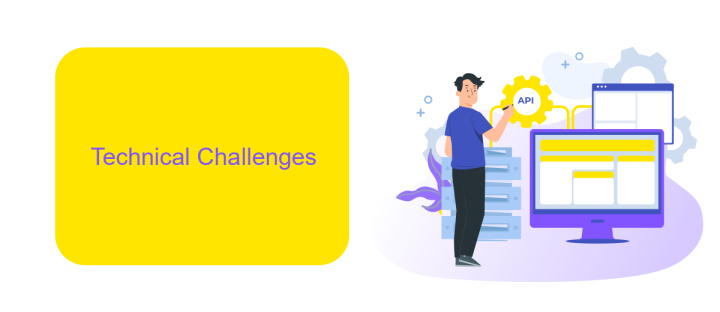Challenges of Data Integration
Data integration is a critical process in today's data-driven world, enabling organizations to combine information from diverse sources into a unified view. However, this task is fraught with challenges, including data quality issues, disparate data formats, and scalability concerns. Addressing these challenges is essential for businesses to leverage their data effectively and make informed decisions. This article explores the key obstacles in data integration and potential solutions.
Introduction
Data integration is a critical process in today's digital landscape, enabling organizations to combine data from various sources into a unified view. This process is essential for making informed decisions, enhancing operational efficiency, and improving overall business intelligence. However, achieving seamless data integration presents numerous challenges, including data quality issues, disparate data formats, and the complexity of managing large volumes of data.
- Data Quality: Ensuring the accuracy, consistency, and reliability of data from multiple sources.
- Disparate Data Formats: Integrating data from different formats, such as structured, semi-structured, and unstructured data.
- Volume and Velocity: Handling the sheer volume and speed at which data is generated.
- Security and Compliance: Managing data privacy and regulatory requirements.
- Scalability: Ensuring the integration solution can scale with the growing data needs.
To address these challenges, organizations can leverage integration platforms like ApiX-Drive. ApiX-Drive simplifies the process by providing a user-friendly interface to connect various applications and automate data workflows without requiring extensive technical expertise. By using such tools, businesses can streamline their data integration processes, ensuring that data is accurate, timely, and accessible for decision-making.
Technical Challenges

One of the primary technical challenges in data integration is dealing with the heterogeneity of data sources. Different systems often use various formats, structures, and protocols, making it difficult to create a unified view of the data. This complexity is compounded by the need to maintain data quality and consistency across disparate systems. Ensuring that data is accurately transformed and mapped from one system to another requires robust ETL (Extract, Transform, Load) processes, which can be resource-intensive and error-prone.
Another significant challenge is the real-time synchronization of data across multiple platforms. As businesses increasingly rely on real-time analytics, the demand for up-to-the-minute data integration grows. Tools like ApiX-Drive can help mitigate this challenge by offering automated workflows that facilitate seamless data transfer between applications. However, even with such tools, ensuring low latency and high reliability in data synchronization remains a complex task. Additionally, securing data during the integration process is critical, as data breaches can have severe consequences. Implementing robust security measures, such as encryption and access controls, is essential to protect sensitive information.
Data Quality Challenges

Ensuring data quality is a significant challenge in data integration processes. Poor data quality can lead to inaccurate analytics, misguided decision-making, and ultimately, business losses. It's crucial to address these issues to ensure the reliability and accuracy of integrated data.
- Data Consistency: Inconsistent data formats and standards across different sources can lead to discrepancies and errors.
- Data Accuracy: Errors in data entry, outdated information, and duplicate records can compromise the accuracy of integrated data.
- Data Completeness: Missing data fields or incomplete records can result in an incomplete dataset, affecting analysis and insights.
- Data Timeliness: Delays in data updates can lead to outdated information being used in decision-making processes.
- Data Transformation: Converting data from various formats into a unified format can introduce errors if not handled correctly.
To tackle these challenges, leveraging tools like ApiX-Drive can be beneficial. ApiX-Drive automates data integration, ensuring consistent data formats, timely updates, and accurate transformations. By using such services, businesses can significantly enhance their data quality and reliability, leading to more informed decision-making and operational efficiency.
Governance and Security Challenges

Governance and security are critical challenges in data integration, requiring robust frameworks to ensure data integrity and compliance. Organizations must implement stringent policies to manage access and control over data, ensuring that only authorized personnel can handle sensitive information.
Moreover, integrating data from multiple sources often exposes vulnerabilities that can be exploited by malicious actors. This necessitates the adoption of advanced security measures, including encryption, secure APIs, and regular security audits to safeguard data during transit and storage.
- Develop and enforce data governance policies
- Implement role-based access controls (RBAC)
- Utilize secure data transfer protocols and encryption
- Conduct regular security audits and vulnerability assessments
- Ensure compliance with relevant regulations and standards
Services like ApiX-Drive can facilitate secure data integration by providing encrypted connections and compliance with data protection regulations. By leveraging such platforms, organizations can streamline the integration process while maintaining high standards of governance and security.


Conclusion
In conclusion, data integration remains a critical yet challenging aspect of modern data management. The complexity arises from the need to harmonize disparate data sources, maintain data quality, and ensure real-time synchronization. Organizations must navigate these obstacles to achieve seamless data flow and derive actionable insights. Effective data integration strategies are crucial for enhancing decision-making processes and operational efficiency.
Leveraging advanced tools and services, such as ApiX-Drive, can significantly streamline the integration process. ApiX-Drive offers a user-friendly platform that automates data synchronization across various applications, reducing manual effort and minimizing errors. By adopting such solutions, organizations can overcome integration challenges, ensuring their data ecosystems are both robust and agile. As the demand for integrated data continues to grow, investing in reliable integration services will be key to staying competitive in an increasingly data-driven world.
FAQ
What are the main challenges of data integration?
How can I ensure data quality during integration?
What are data silos and how do they affect integration?
How can automation tools help in data integration?
What are the best practices for successful data integration?
Apix-Drive is a simple and efficient system connector that will help you automate routine tasks and optimize business processes. You can save time and money, direct these resources to more important purposes. Test ApiX-Drive and make sure that this tool will relieve your employees and after 5 minutes of settings your business will start working faster.

